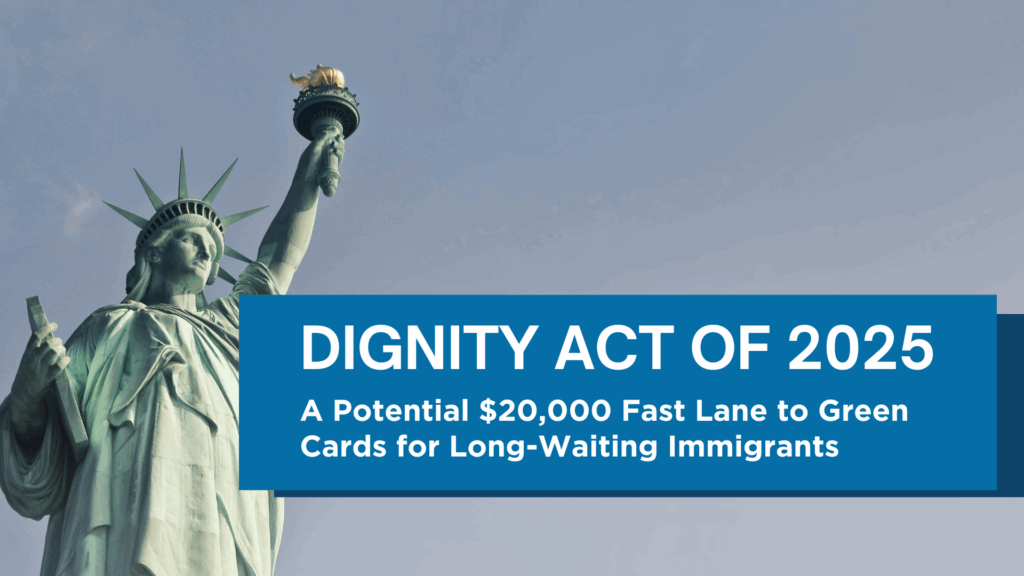
For thousands of immigrants stuck in the U.S. green card backlog for over a decade, the wait has been more than just frustrating — it’s been life-changing. A new bipartisan immigration proposal, The Dignity Act of 2025 (H.R. 4393), could change that. If passed, this bill would allow certain long-waiting applicants to pay a $20,000 premium fee to bypass the green card backlog entirely.
At VKM Law Group, our Immigration Attorneys in New Jersey are closely monitoring this legislation and its potential impact on both family- and employment-based applicants.
What Is the Dignity Act of 2025?
The proposed bill would create an optional fast-track program for individuals who have been in the green card queue for 10 years or more.
Key features include:
- $20,000 premium processing fee per green card application
- Eligibility limited to applicants with 10+ years in the backlog
- Increased per-country limits from 7% to 15% for family- and employment-based categories
- Goal to eliminate the backlog entirely by 2035
- Optional participation — applicants can remain in the standard queue
Unlike current USCIS premium processing (which speeds up certain petitions like the I-140 or I-129), this would directly accelerate green card issuance, even for those stuck due to visa cap limits.
Why This Matters for Long-Waiting Immigrants
The green card backlog disproportionately impacts applicants from high-demand countries like India and China, where wait times often stretch over a decade.
Long waits can lead to:
- Career stagnation – H-1B holders may face limits on promotions or job mobility
- Family hardship – Children risk “aging out” before parents secure green cards
- Constant uncertainty – Families remain in limbo without permanent residency
For tech executives, healthcare employers, and manufacturing leaders relying on foreign talent, this bill could also help retain key employees and reduce turnover caused by visa uncertainty.
How Would the Fast-Track Work?
If enacted, eligible applicants would:
- Submit a request for the fast-lane green card process
- Pay the $20,000 fee per application
- Skip the visa bulletin queue and receive permanent residency faster
The bill’s sponsors also intend for the premium fee revenue to fund USCIS improvements, potentially reducing wait times for everyone.
Who Could Benefit?
This proposal could significantly help:
- Indian professionals in EB-2 or EB-3 categories who have waited 10+ years
- Family-sponsored applicants from oversubscribed countries
- Employers seeking stability for long-term foreign hires
- Families separated by immigration delays
Potential Concerns
While many see this as a long-overdue relief option, some concerns have been raised:
- Accessibility — The $20,000 fee may only be affordable for higher-income applicants
- Fairness — Questions remain about equal treatment of all applicants
- Implementation — Success depends on how USCIS manages the program
What This Means for You
As of today, the Dignity Act of 2025 is not yet law. But if you’ve been in the green card backlog for more than 10 years, this could be a transformative opportunity — especially if you or your employer can justify the cost for the sake of stability and long-term security.
At VKM Law Group, our experienced Visa Attorneys in the USA and Immigration Attorneys can help you:
- Understand your eligibility under the proposed bill
- Explore alternative immigration strategies if you’re not yet at the 10-year mark
- Plan for a fast-track application if and when the bill becomes law
VKM Law Group’s Final Take:
Immigration reform is always complex, and while this bill offers hope, it’s important to get personalized legal guidance before making any decisions. Contact VKM Law Group today to discuss how upcoming immigration changes may impact your case.